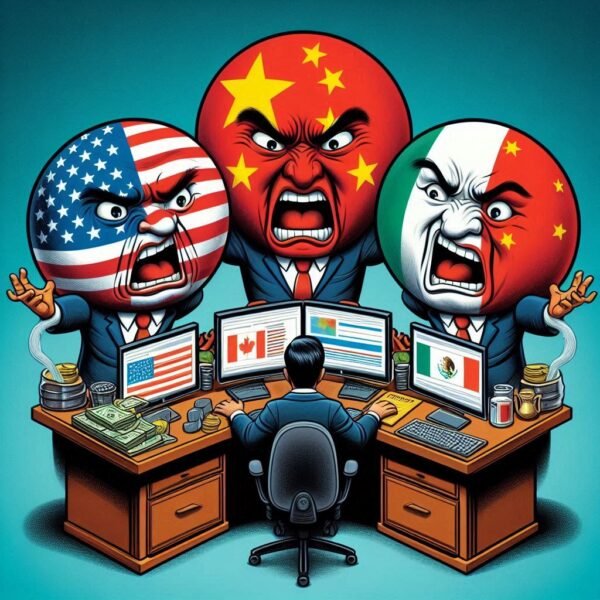US tariffs Impact on Canada, Mexico and China? Reaction of Nations

The recent imposition of tariffs by the U.S. on Canada, Mexico, and China has elicited significant reactions from these nations, highlighting the complexities of international trade relations and the potential economic ramifications.
On February 1, 2025, President Trump announced a 25% tariff on most imports from Canada and Mexico, alongside a 10% tariff on imports from China. This move is part of a broader strategy aimed at addressing issues related to illegal immigration and drug trafficking, particularly concerning fentanyl. The tariffs are set to take effect on February 4, 2025, and are intended to raise federal revenue while promoting domestic manufacturing.
Economic Impact: Experts predict that these tariffs could have severe economic consequences:
Canada: Projected to experience a 3.6% contraction in its economy due to the tariffs, with Prime Minister Justin Trudeau announcing retaliatory tariffs on $107 billion worth of American goods.
Mexico: Expected to face a 2% decline in its economic growth. President Claudia Sheinbaum has indicated that Mexico will respond with its own tariffs but has emphasized the importance of dialogue over confrontation.
China: Criticized the tariffs and announced plans to file a complaint with the World Trade Organization (WTO), asserting that such measures are unjust. China is also preparing countermeasures but has not detailed their scope.
Reactions from Affected Nations
Canada: Trudeau’s government has taken a firm stance against the U.S. tariffs, emphasizing that Canada will retaliate “dollar for dollar.” This reflects a broader commitment to challenge perceived injustices in trade relations.
Mexico: While advocating for diplomatic solutions, Mexico’s government has confirmed that it will implement retaliatory tariffs. Sheinbaum’s administration is developing a comprehensive response plan that includes both tariff and non-tariff measures.
China: Officials have expressed strong dissatisfaction with the new tariffs. Vice-Premier Ding Xuexiang reiterated China’s desire for a “win-win” resolution to trade tensions while preparing to defend its interests through legal channels and potential countermeasures.
The imposition of these tariffs is expected to lead to inflationary pressures within the U.S., potentially increasing consumer prices by up to 1 percentage point. This could push inflation rates significantly higher than the Federal Reserve’s target of 2% annually. The interconnected nature of the economies means that rising costs could affect various sectors, including automotive and consumer goods, leading to broader economic repercussions across North America and beyond.
The recent U.S. tariffs on Canada, Mexico, and China have triggered immediate retaliatory actions and strong condemnations from these nations. The potential economic fallout raises concerns about inflation and trade stability in North America and globally.
The recent imposition of tariffs by the United States on Canada, Mexico, and China has elicited significant reactions from these nations, highlighting the complexities of international trade relationships.
Impact of US Tariffs
Canada: The U.S. has imposed a 25% tariff on Canadian imports, which Canadian Prime Minister Justin Trudeau described as “unjustified.” In retaliation, Canada plans to implement its own 25% tariffs on approximately $155 billion worth of American goods, effective February 4, 2025. This includes a wide range of products such as beverages, cosmetics, and automotive parts. Economists estimate that these tariffs could shrink Canada’s economy by about 3.6%.
Mexico: Similar to Canada, Mexico faces a 25% tariff on its goods. In response, Mexican officials have announced their intention to impose retaliatory tariffs on U.S. products. The Mexican economy could see a contraction of around 2% due to these tariffs. The Mexican government is also concerned about the potential for increased costs for consumers and disruptions in trade flows.
China: The U.S. has placed a 10% tariff on Chinese imports. In contrast to Canada and Mexico’s robust retaliatory measures, China’s response has been more measured. Beijing has indicated it will take “corresponding countermeasures” and plans to challenge the tariffs at the World Trade Organization (WTO). This restrained approach may reflect a desire to avoid escalating tensions with the U.S., especially given the recent positive diplomatic overtures between the two nations.
Reactions from Nations
Canada’s Reaction: Canada’s government has expressed strong disapproval of the U.S. tariffs, labeling them as unjustified and detrimental to both economies. The Canadian response aims not only to protect its own economic interests but also to signal to the U.S. that such measures are unacceptable. The government is also exploring non-tariff options as part of its strategy.
Mexico’s Reaction: Mexico’s government is similarly poised to enact retaliatory tariffs and is actively engaging in discussions about how best to mitigate the economic fallout from U.S. actions. The focus is on protecting Mexican industries and workers while maintaining trade relations with the U.S.
China’s Reaction: China’s Ministry of Commerce criticized the U.S. tariffs as violations of international trade rules and expressed intentions to safeguard its interests through legal channels at the WTO. Analysts suggest that China may be adopting a strategy that avoids immediate escalation while preparing for longer-term negotiations. This approach allows China to maintain a moral high ground while assessing the political landscape following Trump’s return to power.
Economic Implications
The tariffs are projected to have widespread implications for all involved nations:
Economic experts warn that these tariffs could lead to inflationary pressures within the U.S., potentially raising consumer prices significantly.
For Canada and Mexico, retaliatory tariffs could exacerbate economic contractions, affecting employment and growth prospects in both countries.
China’s restrained response may indicate a strategic choice aimed at preserving diplomatic relations while preparing for potential negotiations or further actions if necessary.
The recent U.S. tariffs have sparked immediate retaliatory measures from Canada and Mexico while prompting a more cautious approach from China. The unfolding situation highlights the delicate balance of international trade relationships and the potential for significant economic repercussions across North America and beyond.
